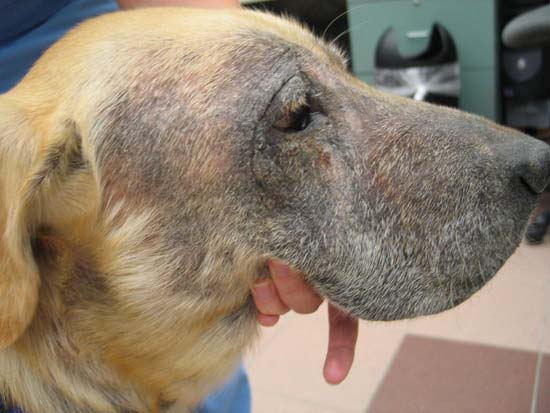Every dog itching himself from time to time, but when he is scratching all the time he clearly has an itch. The cause can come from both outside and within. For example, it can be fleas, scabies, mites, contact allergies, or food allergies. To find out why your dog has itching, you must first check everything step by step and first check whether there are the most common conditions. Once the exact cause of the itching has been found, it can be treated.
The dog is itching
If your dog is scratching all the time, he is clearly itching. Although in some cases it is obvious, for example sometimes with fleas, it does not always have to be that way. Often you do not know where the itching comes from. Scratching can irritate the skin, the dog will bite and lick the spot, which makes the symptoms worse. The skin will flake, become bald, red, and may become damaged, creating a risk of infection. To find out what the cause of the itching is, we first check whether your dog has the most common conditions.
Fleas
Fleas are often immediately thought of when a dog scratches a lot. A flea comb can sometimes quickly determine whether this is the case. When the dog actually has fleas, not only the dog itself but also its environment should be treated. To avoid recontamination, you need to clean everything well, especially the places where the dog lies a lot, such as his basket. A dog can be allergic to fleas and suffer from just one flea bite. In these dogs, it is better to give preventive treatment against fleas. Flea remedies are available at specialty pet stores, but they are also available from a veterinarian
Flea allergy
Some animals are sensitive to flea saliva. After a number of bites, an allergic reaction occurs because a certain limit is exceeded. The dog gets very itchy and will scratch and bite all the time. The body is so sensitive to it that just one flea bite per week can keep this process going.
Sign
Ticks are small parasites that look like tiny spiders. The moment the tick attaches itself to the dog, it starts to suck blood. His body swells and he lets go when he’s had enough. Ticks are found in shrubs and forests. A tick bite can cause some irritation, but that is often not so bad. It mainly concerns the diseases that a tick can transmit, such as Lyme disease.
Scabies mite
Mites are small creatures that burrow into the skin, causing scabies. In dogs, it is sometimes easily visible at the ears, but it can occur anywhere on the body. In order to make the diagnosis, the vet will scrape a bit of the skin to examine this. A well-known scab species is Demodex. This is located in the deeper skin layer. The dog is very itchy and can scratch his skin. This can cause a bacterial skin infection as a secondary problem.
Food allergy
With a food allergy, there is often a hypersensitivity to a component in the feed. Often it comes from a protein from the meat. It occurs in most dogs before the first year of life. The dog may get itchy between the toes, in the groin, and on his ears. If you want to find out if your dog has a food allergy, you can give him special food that does not contain a protein source for six weeks. He is not allowed any further snacks. If your dog has stopped showing an allergic reaction after six weeks, you can gradually feed it back to the other food. If the complaints return, you know that he is allergic.
Contact allergy
Sometimes the dog is allergic to something it comes into direct contact with, such as a pillow, rug, or cleaning agent. Usually, the dog has an itchy stomach, bottom of legs, and chin because he comes into contact with the allergen in these parts of the body. Remove the object that you think is causing the allergy and see if the symptoms improve.
Atopy
This is a hypersensitivity to airborne substances. It is often seasonal and is similar to hay fever in humans. The diagnosis is made by a skin test. Small amounts of the allergens are injected here. A blood test can also be done. When atopy has been diagnosed, allergens should be avoided as much as possible.








